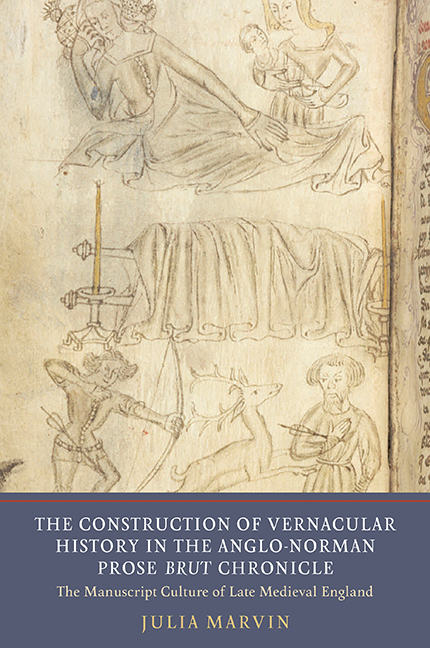 The Construction of Vernacular History in the Anglo-Norman Prose Brut Chronicle
The Construction of Vernacular History in the Anglo-Norman Prose Brut Chronicle Book contents
- Frontmatter
- Dedication
- Content
- List of Plates
- Acknowledgments
- Abbreviations
- A Note on Proper Names, Transcriptions, and Translations
- Introduction: Recognizing the Prose Brut Tradition
- Part I Construction
- Part II Reconstruction and Response
- Conclusion: Merlin's Power
- Bibliography
- General Index
- Index of Manuscripts Cited
Part II - Reconstruction and Response
Published online by Cambridge University Press: 01 February 2018
- Frontmatter
- Dedication
- Content
- List of Plates
- Acknowledgments
- Abbreviations
- A Note on Proper Names, Transcriptions, and Translations
- Introduction: Recognizing the Prose Brut Tradition
- Part I Construction
- Part II Reconstruction and Response
- Conclusion: Merlin's Power
- Bibliography
- General Index
- Index of Manuscripts Cited
Summary
In the first part of this book, I examined the text of the Oldest Version of the Anglo-Norman prose Brut (as established in an edition) against sources and analogues (generally also as established in editions) and attempted to identify (through the filters set by editions) patterns of composition and adaptation that reveal something of its maker's intentions, in order to articulate what dominates the understanding and presentation of history that the Oldest Version provides, what sets it apart from its ancestral texts, and how it challenges received opinion about the range of views commonly available and held in late medieval England. The meanings with which a writer seeks to imbue a text are one thing: the meanings that arise from it over time are another. Trying to recover intention is of course not at all equivalent to trying to declare the true meaning of a work. It may, however, help elucidate what subsequent audiences could have found there as they began the process of generating meanings of their own.
Having considered what went into the Oldest Version, I will now turn to what came of it. In this part of the book, I will consider the production of the Anglo-Norman prose Brut, the manuscript context in which it appears, the evidence of ordinatio, apparatus, and annotation, and the illustrations that a few manuscripts incorporate, all of which reveal aspects of reception and interpretation that fall by the wayside in almost any printed edition. The most heavily used manuscripts may be the least prone to survive, and manuscripts held by the highly educated, whose habits of use may well differ from those of the less educated, may have been more likely to make it into institutional libraries and the hands of early collectors. However representative a sample the surviving manuscripts may or may not be, they do provide concrete, contemporary evidence as to what the creators and audiences of the Anglo- Norman prose Brut made of it, as well as their broader approaches to making sense of history and historical narrative.
- Type
- Chapter
- Information
- The Construction of Vernacular History in the Anglo-Norman Prose Brut ChronicleThe Manuscript Culture of Late Medieval England, pp. 129 - 130Publisher: Boydell & BrewerPrint publication year: 2017


